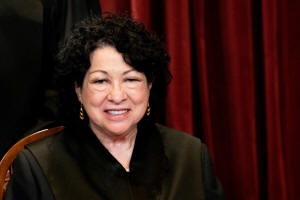U.S. Supreme Court's Sotomayor lets Yeshiva University bar LGBT student
club for now
 Send a link to a friend
Send a link to a friend
 [September 10, 2022]
By Andrew Chung and Nate Raymond [September 10, 2022]
By Andrew Chung and Nate Raymond
(Reuters) -U.S. Supreme Court Justice Sonia
Sotomayor on Friday permitted Yeshiva University to refuse to recognize
an LGBT student club that the Jewish school in New York City has said
violates its religious values, temporarily blocking a judge's ruling
ordering it to allow the group.
Sotomayor put on hold for now the judge's ruling that a city
anti-discrimination law required Yeshiva University to recognize Y.U.
Pride Alliance as a student club while the school pursues an appeal in a
lower court. The liberal justice handles certain cases for the court
from a group of states including New York.
A stay Sotomayor issued of the judge's injunction will remain in place
pending a further order from herself or the entire Supreme Court, which
has a 6-3 conservative majority.
Yeshiva's student club application process was set to end on Monday, and
the school said that absent the court's intervention it would be forced
to recognize Y.U. Pride Alliance in violation of its religious values.

"We are grateful that Justice Sotomayor stepped in to protect Yeshiva’s
religious liberty in this case," Eric Baxter, a lawyer for Yeshiva at
the conservative legal group Becket Fund for Religious Liberty, said in
a statement.
Katherine Rosenfeld, a lawyer for the club, said it will await a final
order from the court and remains committed to creating a safe space for
LGBT students on the university's campus "to build community and support
one another without being discriminated against."
Y.U. Pride Alliance formed unofficially as a group in 2018 but Yeshiva
determined that granting it official status would be "inconsistent with
the school's Torah values and the religious environment it seeks to
maintain."
The dispute hinges in part on whether Yeshiva is a "religious
corporation" and therefore exempt from the New York City Human Rights
Law, which bans discrimination by a place or provider of public
accommodation.
New York state judge Lynn Kotler in June determined that the school's
primary purpose is education, not religious worship, and it is subject
to anti-discrimination law. Kotler also rejected the university's
argument that forcing it to recognize the club would violate its
religious freedom protected under the U.S. Constitution's First
Amendment.
[to top of second column]
|

Associate Justice Sonia Sotomayor poses during a group photo of the
Justices at the Supreme Court in Washington, U.S., April 23, 2021.
Erin Schaff/Pool via REUTERS/File Photo

After higher state courts in August refused to stay the judge's
ruling, Yeshiva turned to the U.S. Supreme Court, emphasizing its
religious character, including that undergraduate students are
required to engage in intense religious studies.
"As a deeply religious Jewish university, Yeshiva cannot comply with
that order because doing so would violate its sincere religious
beliefs about how to form its undergraduate students in Torah
values," the school told the Supreme Court.
The Modern Orthodox Jewish university, based in Manhattan, has
roughly 6,000 students enrolled in undergraduate and graduate
programs. Among the school's values, according to its website
https://www.yu.edu/about/values, are believing in "the infinite
worth of each and every human being" and "the responsibility to
reach out to others in compassion."
Powered by its increasingly assertive conservative justices, the
U.S. Supreme Court in recent years has expanded religious rights
while narrowing the separation between church and state.
During its term that ended in June, the court backed a public high
school football coach in Washington state who refused to stop
leading Christian prayers with players on the field after games and
ruled in favor of Christian families in Maine who sought access to
taxpayer money to pay for their children to attend religious
schools.
In its upcoming term, which begins on Oct. 3, the court will decide
a major new legal fight pitting religious liberty against LGBT
rights involving an evangelical Christian web designer's free speech
claim that she cannot be forced under a Colorado anti-discrimination
law to produce websites for same-sex marriages.
(Reporting by Nate Raymond and Andrew Chung in New York; Editing by
Will Dunham)
[© 2022 Thomson Reuters. All rights
reserved.]
This material may not be published,
broadcast, rewritten or redistributed.
Thompson Reuters is solely responsible for this content.
 |